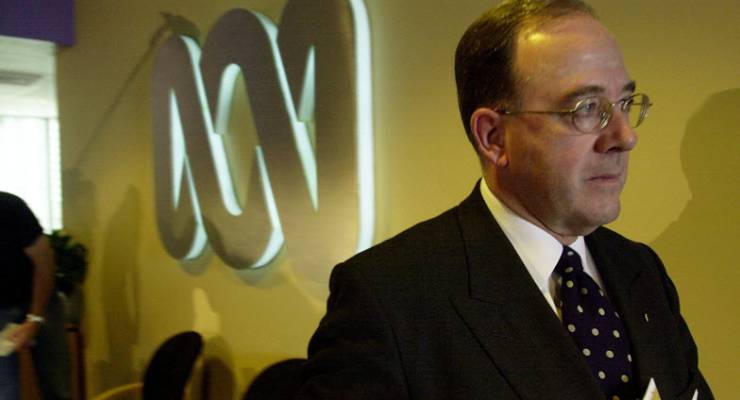
Then ABC chair Donald McDonald at a press conference in 2000.
UPDATE: Since this piece was published, the ABC board has asked for and received Milne’s resignation.
The pressure is mounting on ABC Chair Justin Milne, after revelations that he told recently fired managing director Michelle Guthrie to sack presenter Emma Alberici, after Alberici’s work brought a series of complaints from the Turnbull government.
On Wednesday afternoon, ABC staff in Sydney held an emergency meeting calling for Milne to stand aside and for an inquiry to be held into his actions. This morning, leaks to The Daily Telegraph further damaged his standing; alleging he also tried to get political editor Andrew Probyn sacked at the bidding of the former prime minister. Milne, for his part, has so far been steadfast, telling ABC Melbourne presenter Raf Epstein he would not be resigning.
The ABC has, of course, always been a tempting target for a government under fire. We spoke to a few ABC veterans about management’s response to previous controversies, and whether there is any possibility Milne could continue.
Insiders host Barrie Cassidy told Crikey that decisions around the future of the chairman was a “matter for the board and the government”. “However it remains uncontested by the chairman that he wanted Emma Alberici fired because the government hated her and that the government could be re-elected. He made no other case in that email,” Cassidy said.
“That goes to the heart of ABC independence and enshrined in the act is an obligation on the board not just to act independently but to protect that independence. If a journalist can be sacked simply to appease a government then that independence is shredded.”
Jonathan Holmes, former ABC journalist and Media Watch host said it was within the role of the board to ensure “news and information is accurate and impartial according to the recognised standards of objective journalism”, and suggested it is not out of line to pass on commentary regarding output.
“But what’s really alarming is that Milne’s response to the complaints about the second piece, which, unlike the first, was found to not have any serious errors, was to say — off the top of his head, and with no consultation with the rest of the board — ‘she’s got to go’, not ‘we should look into this, has she actually made mistakes?’. Just: ‘fire her’.”
“There’s no way for the board to force him out, and I doubt Milne will offer his head on a platter,” Holmes continued. “I don’t know Milne well, but in a way he reminds me of David Hill when he was chair. He was a forthright, confident, and interventionist chairman, not necessarily a bad one, but unpredictable, hard to work for.”
By the time the first Iraq War broke out in 1990, Hill had moved from the board to managing director.
Quentin Dempster, an ABC broadcaster of nearly three decades, told Crikey this was a particularly trying time for the broadcaster. “Bob Hawke was prime minister and was outraged at the ABC’s coverage, particularly over the use of Middle East analyst Dr Robert Springborg,” Dempster told Crikey. “In the fallout over that, head of news and current affairs Peter Manning had to stand up to Hill when Hill wanted to appease Hawke by sacking current affairs presenter Geraldine Doogue.”
When the “Coalition of the Willing” returned to Iraq in 2003, the ABC coverage again became a political target. AM‘s reporting alone attracted a staggering 68 complaints from then-Communications Minister Richard Alston (which Dempster calls “often trivial and vexatious” — an observation Crikey has a hard time dissenting from). Further, the network was threatened with the imposition of an “independent censor”.
By this time, Donald McDonald was chairman of the ABC board — and dogged by the allegation that he was too close to prime minster John Howard (they were personal friends).
Cassidy said McDonald was a “fine chairman, one of the best, who consistently spoke out in defence of the organisation and its staff”.
“McDonald handled the PM and ministerial complaints about ABC Gulf War II coverage through the bureaucratic process, where some ABC journalists were birched over the language they’d used in their reports, but the adjudications overall were that everyone had done a professional job,” Dempster said.
McDonald was backed up by director of news and current affairs Max Uechtritz and managing director Russell Balding, who stood “vigorously” by his journalists and their reporting.
Dempster said the email had “destroyed the confidence of ABC journalists in this chairman … [Milne] has revealed through the language in his emails that he does not understand that his first duty is to secure the demonstrable independence of the ABC. In short his position is untenable and he should resign.”
Holmes, who was also one of the reporters involved in the initial controversy over the Gulf War in 1990, said he struggled to think of an equivalent to Milne’s intervention.
“Management usually stick by the ABC’s coverage. That’s what makes this so unusual,” he said.
“But then, we’ve never seen leaks like this against a sitting chair. Maybe it happens more than we know.”








When the “Coalition of the Willing” returned to Iraq in 2003, the ABC coverage again became a political target. AM’s reporting alone attracted a staggering 68 complaints from then-Communications Minister Richard Alston (which Dempster calls “often trivial and vexatious” -….Further, the network was threatened with the imposition of an “independent censor”.
Mitch Fifield carries on the proud tradition of “trivial and vexatious” complaints today.
This one will run & run…
Hopefully.
But unlikely to be more than a fart in the hurricane for the average punter, if the media viewing figures reported in Crikey at any indication.
It used to be said that crucial in voting intentions was the ‘hip pocket nerve’ but it has to be connected to the brain.
That connection seems to be have severed.